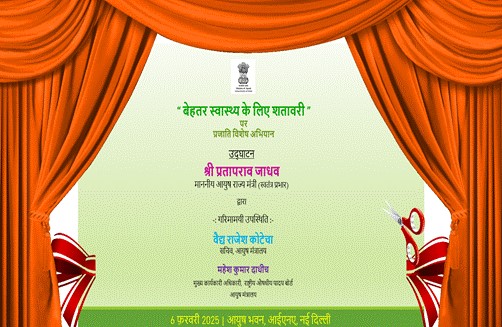Shatavari

- 07 Feb 2025
In News:
The Ministry of Ayush has launched a nationwide campaign titled “Shatavari – For Better Health” to raise public awareness on the health benefits of Asparagus racemosus (commonly known as Shatavari), especially in the context of women’s health and the broader objective of holistic well-being.
About Shatavari (Asparagus racemosus)
- Family: Asparagaceae (formerly Liliaceae)
- Common Names: Satawar, Satamuli
- Ayurvedic Significance: Known as the “Queen of Herbs”, Shatavari is praised in classical Ayurvedic texts like Charak Samhita and Ashtang Hridayam for treating women’s reproductive health disorders.
- Name Meaning: ‘Shatavari’ translates to “acceptable to many”, signifying its diverse benefits.
- Botanical Description: It is a woody climber (1–2 meters tall), with pine-needle-like leaves and small white flowers.
- Habitat and Distribution: Found in tropical climates at low altitudes across Asia, Africa, and Australia.
Medicinal Uses
- The dried roots of Shatavari are used medicinally.
- Acts as a tonic, diuretic, galactagogue (promotes lactation), and has ulcer-healing properties.
- Strengthens mucosal resistance and provides cytoprotection.
- Widely used for addressing female reproductive health issues, immunity enhancement, and promoting overall vitality.
The Campaign: “Shatavari – For Better Health”
- Launched by: Shri Prataprao Jadhav, MoS (Independent Charge), Ministry of Ayush.
- Organized by: National Medicinal Plants Board (NMPB).
- This campaign follows successful species-specific initiatives on Amla, Moringa, Giloe, and Ashwagandha.
- Shatavari is being positioned as a crucial resource in advancing women’s health, supporting the Panch Pran Goals set by the Prime Minister for a Developed India by 2047.
- Focus on achieving holistic well-being and integrating traditional medicine with public health awareness.
Policy and Financial Support
- Under the Central Sector Scheme for Conservation, Development, and Sustainable Management of Medicinal Plants, the Ministry promotes the cultivation and sustainable use of Shatavari.
- Financial assistance of ?18.9 lakhs will be provided to eligible organizations to support awareness and adoption.
